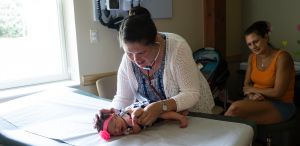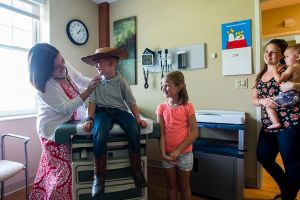August 18, 2017
August 18, 2017
You’ve stocked up on fall clothing essentials. You purchased school supplies and the all-important backpack. With the first day of school

right around the corner, how do you focus your child on their new routine? What tips should you consider for the upcoming year? Sugarloaf Pediatrics physicians Dr. Jennifer Schott and Dr. Gina O’Brien – both mothers of two children – offer some practical advice for parents.
Restore Order at Home
Children lead activity-filled lives. Transitioning them from summer mode to school-time schedules can be challenging for both parents and children.
Maintain a routine schedule with meals, bedtimes, and regular exercise. If summertime interrupted the order in your house, restore the routine by setting small, manageable, and attainable goals, such as relaxing and preparing for bed 20 minutes earlier than during the summer. If your child went to camp or attended a summer class, the routine of that experience will be fresh in his or her mind.

Adjust Sleep Habits
The amount of sleep a child needs depends on the individual child and his or her age. Research suggests that children who are well-rested perform better in school and are less prone to mood swings and behavioral issues, and are generally happier and healthier. The Centers for Disease Control and Prevention recommend that preschoolers sleep between 11 and 13 hours per night. Adolescents typically require 8.5 to 9.5 hours of sleep.
Establish a consistent bedtime routine for your child, and stick to it every night. A bedtime routine might include a warm bath, and reading a book. Keep the home quiet and calm as you prepare for bedtime.
Eat Well for Success
As a parent, it’s essential to model good eating habits for your children. Buy healthy foods and limit junk food. Give children a certain amount of freedom to select foods from what you have in your kitchen cabinet or pantry. Your child will appreciate this new-found autonomy to make their choices. Limit desserts, soda, and juice.
Studies show that children who eat breakfast do better in school and have more energy, so provide a breakfast with protein for your child before they head off to school.
Ease Anxiety
Children can be nervous in new situations, such as changing schools or teachers. It can be helpful to prepare by visiting the classroom, playing on the playground, or rehearsing certain scenarios. It can help to remind a nervous child that other students get nervous, too. If your child seems nervous it can help to ask them what they are worried about, and to identify solutions together.
Stay Safe at School
Being safe at school encompasses many areas from how children get to and from school to playground safety. Establish a safe route to your child’s bus stop or school. Use crosswalks, look both ways before crossing the street, and remind children not to talk to strangers.
Safety also includes student violence and bullying. Unfortunately, bullying is a common problem in schools. It can occur both face-to-face and increasingly through social media.
If a child is bullied, he or she should make every effort to stay calm as overreacting to the bully is often a reaction the bully seeks. Encourage your child to be confident and unfazed, which can often diffuse a situation. If the incident occurs face-to-face, the child should look the bully in the eye, calmly ask the bully to stop, and inform the bully he or she wishes to be left alone. In addition, children should inform a parent or teacher if they feel threatened or unsafe.
You want the best for your child at every stage of his or her academic career. Establishing good habits now will help ensure future success. If health concerns arise, contact your pediatrician or family medicine doctor.

